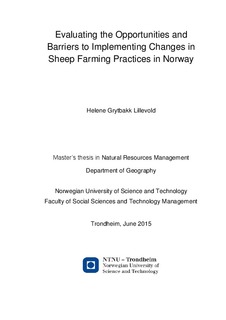| dc.description.abstract | As a result of a more active carnivore management in the past decade the conflict between carnivores and sheep on outfield grazing has increased considerably in recent years. In order to reduce the conflict several mitigating measures has been implemented all around the country.
This study highlights sheep farmer’s opportunities and barriers to implementing operational changes in sheep farming practices, in the context of the conflicts resulting from large carnivore recovery in Norway. Sixteen interviews with sheep farmers were conducted, grouped according to their situation in terms of farming methods. We identified three groups of farmers; those who had changed husbandry methods, those who maintained the traditional methods and those who had given up sheep farming. The individual farmers were thus analysed as groups, not individuals.
The thesis deals with adaptation strategies in carnivore exposed areas. Sheep farmers have taken different choices, based on their perceived reality within the sheep husbandry sector. An attempt is made to describe the reality as perceived by the farmers, while trying to uncover the causes and effects of that reality. There are several factors affecting decision making in terms of the choice of husbandry system, such as loss of sheep to carnivores, economy and profitability, management authorities, the effects of mitigating measures and the value of cultural landscape and outfield. These factors are all detached to each other in one way or another.
A major factor affecting decision making is the conflict about carnivores, and the loss that they experience. There are a lot of emotions connected with big losses, both when you take into consideration the suffering of the herd but also the economic impact. Mental strain, health issues, anger and distrust of the management authorities are some of the effects of their difficulties. The farmers feel frustration at the way the management authorities functions. A scepticism and distrust of the management authorities and government policies is a dominant discourse. The result of the analysis reveals that lack of trust is a major barrier to moving beyond the present in passé.
What it takes to change farming systems to become more viable and adaptable is not a question with an answer to the difficulties in sheep husbandry, simply a suggestion to what could make the situation better in the future, and to help create new conflict reducing measures. The greatest challenge is to create new narratives that focuses on harnessing energy and creativity, but that requires farmers accepting the basic premises.
Key words: sheep farmers, large carnivores, adaptation, barrier | nb_NO |
